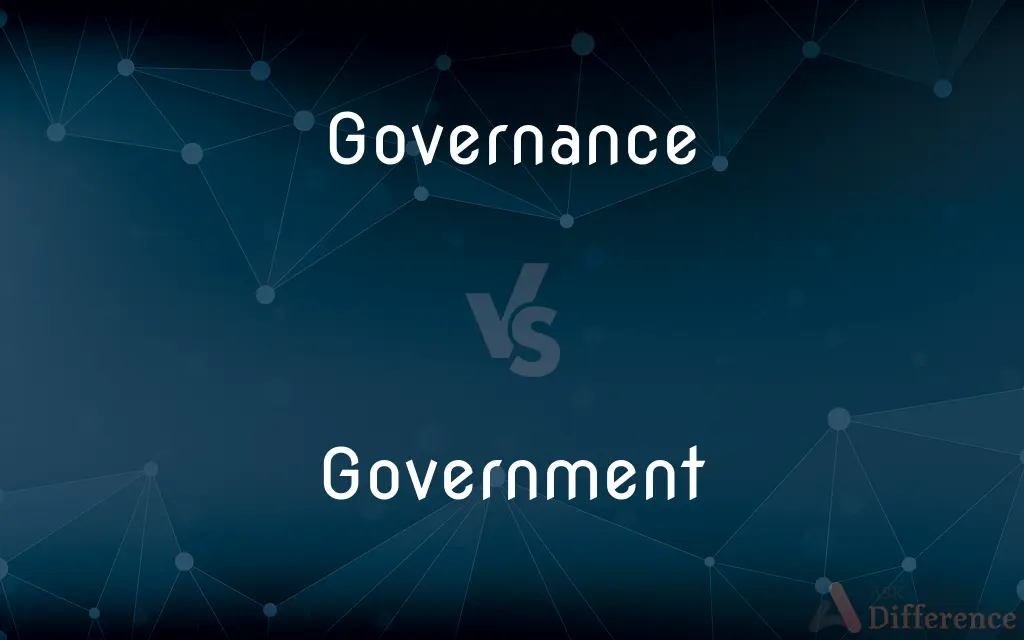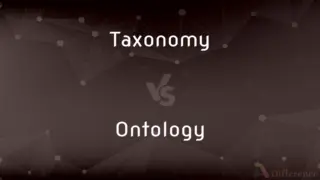Governance vs. Government — What's the Difference?
Edited by Tayyaba Rehman — By Fiza Rafique — Updated on October 5, 2023
"Governance" refers to the process or manner of governing, encompassing decision-making and implementation, while "Government" is the body or organization that governs a nation, state, or community.

Difference Between Governance and Government
Table of Contents
ADVERTISEMENT
Key Differences
At a fundamental level, "Governance" and "Government" both relate to the concept of governing or ruling. "Governance" is a broad term that signifies the methods, processes, and systems used to make decisions and ensure these decisions are implemented. This can relate to any entity, from businesses to nonprofits, and not just political bodies.
"Government", on the other hand, specifically references the established body or institution in a specific region—be it municipal, state, or national—that holds the authoritative power to create and implement laws, regulations, and policies. It is this body that citizens typically elect and which holds the responsibility of running the administrative functions of a nation or state.
While "Governance" outlines the how of governing—how decisions are made, how rules are enforced, and how power is exercised, "Government" is the who of governing. It's the set of people and institutions responsible for the day-to-day administration and leadership of a community or nation.
Expanding on this, "Governance" can also extend to the corporate world, referring to the processes and structures used to direct and manage a company's operations and activities. "Government", however, remains rooted in the political and administrative context.
In essence, while both "Governance" and "Government" are interrelated and sometimes used interchangeably, they have distinct meanings. "Governance" is about the act or process of governing, while "Government" is the entity that carries out this governance.
ADVERTISEMENT
Comparison Chart
Definition
The act, process, or manner of governing.
The body or institution governing a nation, state, or community.
Scope
Can apply to businesses, NGOs, and political entities.
Typically applies only to political entities.
Nature
Abstract, more about processes and methods.
Concrete, referring to specific bodies or institutions.
Usage
Describes how things are run or organized.
Refers to the entity or group that runs or organizes.
Context
Can be used in various contexts beyond politics.
Predominantly used in a political context.
Compare with Definitions
Governance
The method of influence or control over a group or system.
Internet governance involves many stakeholders from around the globe.
Government
The body or organization that governs a nation, state, or community.
The U.S. government is based on a system of checks and balances.
Governance
A framework of rules, relationships, systems, and processes within and by which authority is exercised.
The organization's governance structure was revised to be more inclusive.
Government
The institution through which public policies are made and enforced.
The local government decided to build a new park.
Governance
The way in which a corporation or institution is run, including its processes and practices.
Corporate governance is crucial for maintaining investor trust.
Government
The act or process of governing, especially the control and administration of public policy.
The principles of democratic government are vital for the country.
Governance
Governance is all the processes of interaction be they through the laws, norms, power or language of an organized society over a social system (family, tribe, formal or informal organization, a territory or across territories). It is done by the government of a state, by a market, or by a network.
Government
A specific ruling body, especially one in power at a specific time.
The new government promised economic reforms.
Governance
The action, manner, or power of governing
Principles of good governance.
Government
A government is the system or group of people governing an organized community, generally a state. In the case of its broad associative definition, government normally consists of legislature, executive, and judiciary.
Governance
The process, or the power, of governing; government or administration.
Government
The group of people with the authority to govern a country or state; a particular ministry in office
The government's economic record
Successive Labour governments
Governance
The specific system by which a political system is ruled.
Government
The relation between a governed and a governing word.
Governance
The group of people who make up an administrative body.
Government
The act or process of governing, especially the control and administration of public policy in a political unit.
Governance
The state of being governed.
Government
The office, function, or authority of a governing individual or body.
Governance
(management) Accountability for consistent, cohesive policies, processes and decision rights.
Government
Exercise of authority in a political unit; rule.
Governance
Exercise of authority; control; government; arrangement.
Government
The agency or apparatus through which a governing individual or body functions and exercises authority.
Governance
The persons (or committees or departments etc.) who make up a body for the purpose of administering something;
He claims that the present administration is corrupt
The governance of an association is responsible to its members
He quickly became recognized as a member of the establishment
Government
The ruling political party or coalition of political parties in a parliamentary system.
Governance
The act of governing; exercising authority;
Regulations for the governing of state prisons
He had considerable experience of government
Government
The cabinet in a parliamentary system.
Governance
The act or process of governing.
Good governance ensures transparency and accountability in decision-making.
Government
The persons who make up a governing body.
Governance
The way responsibilities are exercised and accountability is ensured.
Effective governance prioritizes the welfare of all stakeholders.
Government
A system or policy by which a political unit is governed.
Government
Administration or management of an organization, business, or institution.
Government
Political science.
Government
(Grammar) The influence of a word over the morphological inflection of another word in a phrase or sentence.
Government
The body with the power to make and/or enforce laws to control a country, land area, people or organization.
British government has historically centred exclusively on London.
Government
The relationship between a word and its dependents.
Government
The state and its administration viewed as the ruling political power.
If the citizens must follow the law, then the government must follow the constitution.
Government
(uncountable) The management or control of a system.
Government
The tenure of a chief of state.
Government
The act of governing; the exercise of authority; the administration of laws; control; direction; regulation; as, civil, church, or family government.
Government
The mode of governing; the system of polity in a state; the established form of law.
That free government which we have so dearly purchased, free commonwealth.
Government
The right or power of governing; authority.
I here resign my government to thee.
Government
The person or persons authorized to administer the laws; the ruling power; the administration.
When we, in England, speak of the government, we generally understand the ministers of the crown for the time being.
Government
The body politic governed by one authority; a state; as, the governments of Europe.
Government
Management of the limbs or body.
Government
The influence of a word in regard to construction, requiring that another word should be in a particular case.
Government
The organization that is the governing authority of a political unit;
The government reduced taxes
The matter was referred to higher authorities
Government
(government) the system or form by which a community or other political unit is governed;
Tyrannical government
Government
The act of governing; exercising authority;
Regulations for the governing of state prisons
He had considerable experience of government
Government
The study of government of states and other political units
Government
The system or group of people governing a nation.
The British government announced new trade policies.
Common Curiosities
Can a business have governance?
Yes, businesses often have corporate governance structures.
Is a "government" always elected by the people?
Not always; governments can be elected, appointed, or hereditary.
Is a monarchy a form of government?
Yes, monarchy is one form of government.
Is governance only about making rules?
No, it encompasses making, implementing, and enforcing rules.
Can governance exist without a government?
Yes, governance refers to processes and systems, which can exist in various contexts.
Are all governments responsible for good governance?
Ideally, yes, but in reality, the quality of governance varies.
Are "governance" and "government" interchangeable?
Though related, they have distinct meanings and aren't always interchangeable.
Why is good governance important?
It ensures accountability, fairness, transparency, and the welfare of the community.
Does governance always relate to politics?
No, governance can relate to any system or organization, including businesses.
How is a government's effectiveness measured?
It can be measured by its policies, responsiveness, transparency, and more.
Can there be global governance?
Yes, it refers to governance at an international level, often by cooperative bodies.
Are governments always large and bureaucratic?
No, the size and structure can vary widely based on the nation or region.
How does government interact with governance?
A government is an entity that carries out governance.
Can governance relate to technology?
Yes, terms like "data governance" or "internet governance" are examples.
Can a government change its governance approach?
Yes, governments can adopt new governance methods or structures over time.
Share Your Discovery

Previous Comparison
Checkered vs. Plaid
Next Comparison
Taxonomy vs. OntologyAuthor Spotlight
Written by
Fiza RafiqueFiza Rafique is a skilled content writer at AskDifference.com, where she meticulously refines and enhances written pieces. Drawing from her vast editorial expertise, Fiza ensures clarity, accuracy, and precision in every article. Passionate about language, she continually seeks to elevate the quality of content for readers worldwide.
Edited by
Tayyaba RehmanTayyaba Rehman is a distinguished writer, currently serving as a primary contributor to askdifference.com. As a researcher in semantics and etymology, Tayyaba's passion for the complexity of languages and their distinctions has found a perfect home on the platform. Tayyaba delves into the intricacies of language, distinguishing between commonly confused words and phrases, thereby providing clarity for readers worldwide.















































